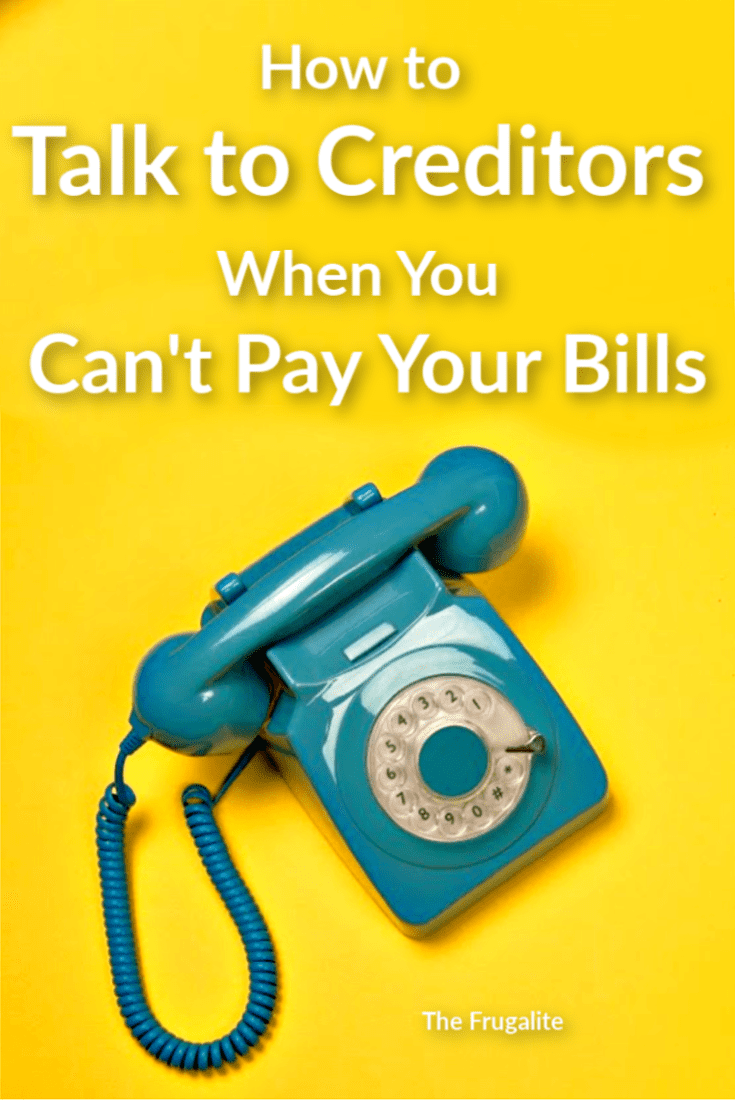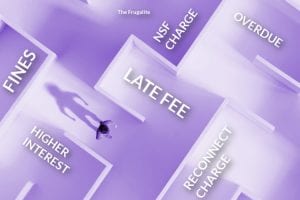(Psst: The FTC wants me to remind you that this website contains affiliate links. That means if you make a purchase from a link you click on, I might receive a small commission. This does not increase the price you’ll pay for that item nor does it decrease the awesomeness of the item. ~ Daisy)
As our economy gets rocked, lots of folks are already beginning to have financial problems. Others see money trouble on the horizon. Unemployment is at an all-time high, and many businesses are closing and filing for bankruptcy.
So if you aren’t having money problems now, it’s very possible you could be soon. And communication is key when dealing with the people to whom you owe money.
What to do when your income slows down
This is something I’ve written about in detail in more than one article. Here’s a detailed article about job loss but the strategies would also work if your hours are cut. The basics are:
- Know your rights. You may have some recourse if your hours are cut or if you are laid off. If you have any type of employment contract, now is the time to go over it with a fine-tooth comb. Don’t sign anything until you’ve taken the time to calm down and think things through.
- Begin a total spending freeze. Give it a couple of days before you spend a dime. You’ll need to re-assess your budget.
- Apply for unemployment. Whether you lost your job completely or your hours were cut, you may qualify for unemployment or other benefits. You’ve been paying taxes for just this reason, so don’t be too proud to accept the help.
- Create a budget for necessities. Sit down and create a budget for the absolute bare minimum expenditures.
- Slash luxury spending. Now isn’t the time to go on a vacation, join a gym, or eat out at restaurants.
- Look for new streams of income. If you can, look for odd jobs, start a small business that doesn’t require an investment, or use your expertise to begin consulting in your field.
- Sell stuff. All that stuff you’ve been meaning to go through in the basement just might be the key to keeping a roof over your head. Sell things online or in person, keeping in mind your personal safety.
- Audit your budget. Take the time to see where you can slash your spending. Can you cut your fixed or variable expenses?
Take action right away to stop the bleeding of money. A few dollars may not seem like much right now but it could be a much bigger deal in the future. You may need to make drastic cuts.
Make a list of your creditors.
Once you have created your new emergency budget, it’s time to take a look at those to whom you owe money. Some of these will be necessary expenditures. Keeping a roof over your head, the utilities on, a car in the driveway, and remaining insured. are likely the most important expenses.
Other expenditures are things like unsecured debt: credit cards, student loans, and personal loans. You may have some secured debt on things with which you’re willing to part – second cars, recreational vehicles, etc.
Write down all these expenses, your account numbers, your minimum monthly payments, and contact information for the creditor.
Before anybody jumps in and says, “You shouldn’t have any credit card debt” or “I bought my car in cash,” remember that I’m writing about a change in circumstances here. Sure it’s better to be debt-free, but when you have found yourself in a crunch, it’s all about surviving the rough time, not about beating yourself up for previous decisions.
Contact them one by one.
Next comes the part that may be difficult for some – you need to contact your creditors and see if they can help.
Keep in mind that many people are running into difficulty right now and these companies know it. Some places may have already authorized negotiations with debtors in expectation of the difficulty in which you currently find yourself.
Contact them in order from most essential to least. The most essential creditors are the ones that keep you housed, fed, and warm. Credit cards should be last on your list in this situation.
Below you’ll find some tips to help you guide the conversation.
How to talk to creditors
When you call your creditors, the most important thing to remember is to be polite. Your financial problems are not the fault of the person on the other end of the phone line. The company’s policies are also not the fault of the person taking your call. You will get much further by being courteous.
I’ve worked in a call center before. I know that when someone spoke to me with respect I was far more likely to work hard to find a solution for them than if they were rude or called me names. This is simply human nature.
Keeping courtesy in mind, here are a few tips.
- Find out the representative’s name. Use it in conversation, although not to the point that it’s weird or annoying. Using a person’s name is humanizing and it feels more like a friendly conversation than a negotiation. You also need to keep the person’s name in your notes so that if your agreement isn’t honored, you can call back and say, “When I spoke to Sally Smith, we agreed that…”
- Explain your situation. After the introductions and verifications are over, tell the representative that you are having difficulty paying your bills because you’ve been laid off or your hours were cut. Let them know you really want to make things right and continue your relationship with the company.
- Ask if there’s anything the company can do to help. Many businesses are currently making contingency plans for financial difficulties. Some will do this willingly, while others may wait until the government mandates it. As an example, in Italy, all mortgage companies have suspended loan payments during the quarantine period. See what the representative says – it may be an even lower payment than you intended to offer.
- If they don’t offer anything, present your own offer. Say, “I’m wondering if I might be able to skip a month on this payment while I look for work” or “Is there any way I can get this payment reduced?”
- Ask for a supervisor. If the representative you’re speaking with can’t help, ask politely, “I know there’s probably a limit to what you can authorize. Is there someone else that might be able to make this happen? Could I please speak to a supervisor?” Sometimes representatives aren’t empowered to make big changes to your account, so you’ll want to speak to somebody who can. Don’t make it seem like you are going over the representative’s head, and be clear that you understand he or she would like to help but may not be able to do so.
- When you get to a supervisor, repeat steps 1-3. Don’t expect the supervisor to know everything that occurred in your previous conversation. Start off pleasantly with, “I spoke with Stacy and she was very kind. However, I don’t think she is in a position to be able to help me with my situation and I was hoping that you might be able to assist me.” Then start from scratch by explaining your situation, then asking if they have any policies in place that might help you.
- Get it in writing. Once you come to an agreement, ask the supervisor to email the changes to you right away. Tell them you want to be sure you understand everything correctly, but the real reason is that you want proof you made this arrangement. Email is the fastest way to do this.
Rinse and repeat this with all of your creditors in order from most essential to least essential. By coming to an agreement, you can protect your credit rating and manage your finances during a difficult time.
Now add these payments to your budget.
Once you’ve made all the arrangements you can make, go back to your budget and revise it with the new payment amounts.
You may find that with a few contributions from your emergency fund, you’re doing okay. You may be dismayed to discover that you still can’t pay your bills.
Then comes a difficult decision: on what do you default? If the money isn’t there, it isn’t there. Wishing it was there won’t make it appear out of thin air. If you’ve already sold stuff, taken on a second job, cut your spending, and spoken to your creditors, there may be a limit to what else you can do.
If you have gotten to a point where you simply cannot pay all of your bills, check out this article, How to Survive When You Can’t Pay Your Bills. It’s a terrible, scary, and humbling place to be. I know because I’ve been there, too. You can get my book about surviving poverty absolutely free here.
Hopefully, speaking to your creditors will help you buy enough time to get through this crisis. I wish you the very best of luck during this difficult period.
Have you been in this situation yourself?
Do you have any advice for those who are struggling to make their payments? Are you having difficulty right now? Please share your thoughts in the comments section.












6 thoughts on “How to Talk to Creditors When You Can’t Pay Your Bills”
Dear Daisy,
It was a great relief to read this article of yours as I am in such a situation. What with the Covid -19 and the fact that my own company is having huge financial problems as well. Please carry on writing these pieces as they provide comfort and hope. Thank you so much for the helpful suggestions.
Rebecca
Absolutely I know about this. I have explained why I am judgement proof and dealt with creditors when I ditched plastic in 2008. Eventually it was written off. Whew.
I still have sample letters to send collection agencies even if I have had zero debt for 13 years.
I lost a Beautiful home in a rural place I loved. Repossession was in the works. I talked with a caller, then his supervisor and then his supervisor. I told what had happened and how hard I’d tried not to be in that position. We ended up not saving the home but I gave them a deed in lieu of foreclosure. Late payment were still out there on my record but no forclosure on my record. That was a plus for me. It gave us plenty of time to move and saved them money. Their lawyer drew up the papers. I signed them and my bank notarized them. Sad to loose that home but it was worth working with them.
Before loosing that home my husbands Alzheimers had cost us all the different credit cards. Those became writeoffs. I still don’t have a credit card. I owe nothing but the month to month utility bills. I sell things, save cash for purchases, and make trades. I love Craigslist free page… 🙂 I remake stuff. I wear mostly 2nd hand but good clothing. Both of our favorite recliners were cheap. His was $40 at a flea market and mine was $35 from Craigslist. I enjoy chasing bargains, cooking our meals, and the challenge of pinching pennies.
Daisy,
As usual from you and your contributors – thoughtful, compassionate and wise advice. My wife of 40 years and I have been debt-free since 1998. Dave Ramsey is right, the grass in the back yard feels better in bare feet, when you don’t owe on a mortgage.. We are very fortunate that our careers and plain old fashioned good luck got us here.
Daisy’s article is all about coping with bills assumed to be legitimate and honestly agreed to. What it does not address is the category of bills that you either strongly suspect are inflated or even bogus — or know for certain that one or the other case is a big problem.
In the last five years I’ve seen more of both highly inflated bills and fat-out bogus bills than ever before. From airline ticket bills between cities I’ve never visited and never intend to (via a fake but convincing website pretending to be from Delta Airlines) to AT&T dishonesty in trying to continue collecting payment from me even AFTER the replacement internet service provider cut their data cable to my house and wired in their replacement cable. AT&T even threatened to send such bills to collection. One outrageous medical episode involved forcibly ambulancing me from a physical rehab facility to a local hospital to have a medical device changed out (that much later I learned was not failing in the least and DID NOT need to be swapped out) and getting a $15,800 bill for a 4-1/2 hour misadventure for an almost trivially simple process that only cost a few hundred dollars when first installed. (As I learned much later I could have easily swapped out that device myself if I’d had a spare handy as I’ve done since a few times at home.) There appears to be no limit to the drama and deceit in the medical arena.
There is one body of knowledge about coping with debt collectors who if they take you to court do not have their legal evidentiary ducks in order in “most” cases if you know what to ask for. There are even some useful videos about this on YouTube.
There is another somewhat complex body of knowledge about coping with medical bills that may be fraudulent, highly inflated, doubled up, or for products or services never provided.
Coping with pushy debt collectors or bogus or highly inflated bills probably justifies some separate articles that require vastly different knowledge than coping with honest legitimate bill issues.
–Lewis